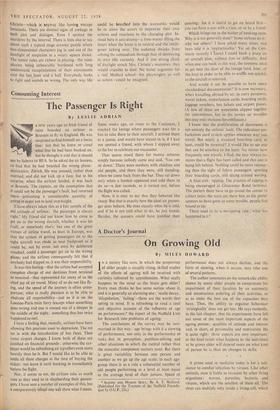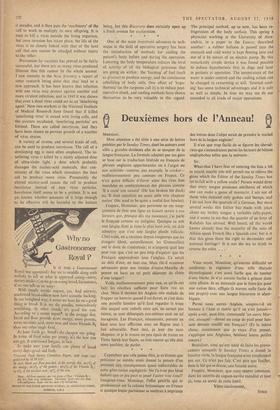A Doctor's Journal
On Growing Old
By MILES HOWARD N a society like ours, in which the proportion of older people is steadily rising, skilled studies of the effects of ageing will be received with curiosity coloured by apprehension. What really happens to the mind as the brain gets older? Every man thinks he has some notion about it, and it is generally an alarming one : 'senile decay, 'dilapidation,' failing'—these are the words that spring to mind. It is refreshing to read a cool and objective account of the influence of age on performance,* the report of the Nuffield Unit for Research into problems of ageing.
The conclusions of the survey may be sum- marised in this way : age brings with it a slowing of performance, not only in the performance of tasks but in perception, problem-solving and other situations in which the mental rather than the muscular component matters most. But there is great variability between one person and another as we go up the age scale; in each age- group there is as a rule a substantial number of old people performing at a level at least equal to the average level of their juniors. Speed of * AGEING AND HUMAN SKILL. By A. T. Welford. (Published for the Trustees of the Nuffield Founda- tion by O.U.P., 25s.) performance does not always decline, and the form of slowing, when it occurs, may take one of several patterns.
The author comments on the remarkahle abilii shown by many older people to compensate for impairment of their faculties by an automatic and unconscious ordering of their activities, so as to make the best use of the capacities they . have. Thus, the ability to organise behaviour 'strategically' does not get lost. He says modestly. in the last chapter, that his experiments have left out. some of the most important aspects of the ageing person qualities of attitude and interest and, in short, of personality and motivation. He is quite right : th.:se aspects are very important: in the final result what happens to the individual as he grows older will depend more on what kind of person he is than on changes in skills.
A prime need in medicine today is for a sub- stance to combat infection by viruses. Like other animals, man is liable to invasion by other living organisms : worms, parasites, bacteria and viruses, which are the smallest of them all. The virus can multiply only inside a living cell, which it invades, and it then puts the 'machinery' of the cell to work to multiply its own offspring. It is easy to kill a virus outside the living organism, but once invasion has taken place, the life of the virus is so closely linked with that of the host cell that one cannot be attached without injury to the other.
Prevention by vaccines has proved /to be fairly successful, but there are so many virus-produced illnesses that this cannot be the whole answer. I saw recently in the New Scientist a report of some research being done that may lead to a new approach. It has been known that infection with one virus may protect against another and more virulent infection; and in 1943 it was shown that even a dead virus could act as an 'interfering agent.' Now two workers at the National Institute of Medical Research haye found that if killed 'interfering virus' is mixed with living cells, and the mixture incubated, 'interfering particles' are formed. These are called interferon, and they have been shown to prevent growth of a number of virus strains.
A variety of strains, and several kinds of cell, can be used to produce interferon. The cell of a developing egg is most often employed. The in- terfering virus is killed by a nicely adjusted dose of ultra-violet light, a dose which probably damages the nucleic-acid molecule, that con- stituent of the virus which stimulates the host cell to produce more virus. Presumably the altered nucleic-acid causes the cell to produce interferon instead of new virus particles. Interferon itself seems to be a protein. It is not yet known whether amounts of it large enough to be effective will be harmful to the human being, but this discovery does certainly open up a fresh avenue for exploration.
One of the most iinportant advances in tech- nique in the field of operative surgery has been the introduction of methods for cooling the patient's body before and during the operation. Lowering the body temperature reduces the level of activity of all the biological processes that are going on within : the 'burning' of fuel (such as glucose).to produce energy, and the continuous rebuilding of body cells. One effect of 'hypo- thermia' (as the surgeons call it) is to reduce post- operative shock, and cooling methods have shown themselves to be very valuable in this regard. The principal method, up to now, has been re- frigeration of the body surface. This spring a physician working at the University of Alex- andria, in a paper in the Lancet, described another : a rubber balloon is passed into the stomach and cold water is kept flowing into and out of it by means of an electric pump. By this remarkably simple device it was found possible to induce hypothermia first in dogs and later in patients at operation. The temperature of the water is under control and the cooling action can be changed to rewarming at will. 'Internal cool- ing' has some technical advantages and it is safe as well as simple. In time we may see its use extended to all kinds of major operations.































 Previous page
Previous page